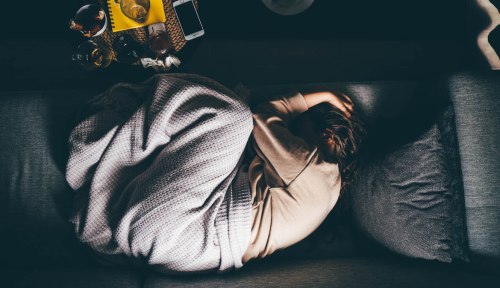‘I’m a Neurologist, and These Are the 6 Best Ways To Prevent Migraine Attacks in Your Daily Life’
If you're wondering how to prevent migraine attacks, you'll want to read these six expert-backed lifestyle tips.

If you’ve ever experienced excruciating, throbbing pain on one side of your head, coupled with nausea, vomiting, and sensitivity to light, smell, and noise, it’s safe to say that you’re probably in the migraine club. Often misunderstood, migraine isn’t just a headache, it’s considered a neurological condition with symptoms that last for hours and shock your world in such a way that you can’t get on with your daily routine. The good news? There are things you can actually do to help prevent migraine attacks from happening in the first place.
Experts in This Article
board-certified neurologist
But first, a refresher on what causes migraine attacks. Well, according to the Mayo Clinic, specific nerves in your blood vessels may send pain signals to your brain, releasing inflammatory substances into the nerves and blood vessels in your head. That then triggers the head pain associated with migraine.
“These lifestyle changes help reduce both the frequency and severity of migraine attacks.”—Rohit Reddy, MD, a neurologist at Dartmouth Hitchcock Clinics.
While it may not be possible to completely avoid migraine attacks, there are both preventive medications that can help stop an attack in its tracks and, as mentioned above, things you can do in your daily life to avoid them as much as possible.
“The best way to prevent migraines is by lifestyle modification,” says Rohit Reddy, MD, a neurologist who specializes in headaches at Dartmouth Hitchcock Clinics in Concord, New Hampshire, and clinical assistant professor of neurology at the Geisel School of Medicine. “These lifestyle changes help reduce both the frequency and severity of migraine attacks by stress reduction, decreased anxiety and depression, and sleep efficiency, all of which have a positive impact on overall brain health.”
Migraine is a lifelong condition that you’ll have to manage, but being mindful of a few lifestyle changes may help you learn how to prevent migraine attacks—so you can get back to living your life.
6 expert-backed tips for to prevent migraine attacks
1. Keep a regular sleep schedule
Good sleep is important for the brain to rest and recover from the hustle of the day, so it’s best to go to bed and wake up at the same time throughout the week, says Dr. Reddy.
“Sleep serves a vital function in clearing the products of metabolism from neurons which are highly active during the day’s wakefulness. Being able to have restful sleep improves attention, and alertness and reduces stress, which would otherwise reduce the threshold for having a migraine attack,” he says.
2. Eat nutritious foods frequently
What you put in your body is important, but it’s crucial that you don’t skip meals. A good approach is to eat frequent meals and snacks, as that helps to keep your blood sugar levels in a good range, says Dr. Reddy. Certain foods can also be migraine triggers for people.
“The foods to avoid vary from person to person,” Dr. Reddy says. “There are specific foods which can trigger or worsen migraines in certain people, such as certain wines, cheeses, and food additives (such as MSG). You won’t know until you can identify a specific pattern. In general, sugary foods and drinks should be avoided as well as heavily caffeinated beverages such as energy drinks.”
3. Drink plenty of fluids
Aim to drink 40 to 60 ounces of fluids daily, while avoiding sugary or heavily caffeinated drinks—especially later in the day, though small amounts during the day may be helpful, says Dr. Reddy.
“Drinking a lot of water is generally the way to go. When you’re dehydrated, your brain and other tissues in your body shrink, where they pull away from the inside of the skull, and this can put pressure on certain nerves and cause pain. Lightly caffeinated beverages such as green tea or sparking seltzer water are also great.”
4. Try to make exercise a habit
A 2019 study published in The Journal of Headache and Pain found that aerobic exercise helped to decrease the number of migraine attacks people experienced each month on average.
Consistent, purposeful light aerobic exercise is important for overall brain health and 30 minutes a day is ideal, according to Dr. Reddy. “In addition to multiple health-related benefits, exercise also releases endorphins, which are natural painkillers found in the body and naturally promote a sense of well-being and positive feelings.”
5. Identify and avoid your migraine triggers
Foods aren’t the only migraine triggers you’ll want to identify and avoid. If you notice certain situations or things that tend to trigger your migraine attacks—whether flashing lights, loud music, smelly foods, caffeine overload, or abrupt weather changes—you can try your best to avoid those things, and hopefully the migraine attacks.
If you’re not certain about what leads to your attacks, try tracking your symptoms and potential triggers in a journal. That way, you can bring it to your doctor to discuss your best course forward. They may prescribe preventive medications that you can take to help reduce the frequency and severity of your migraine attacks—even if one has already started.
6. Manage stress as much as possible
Okay, easier said than done, but dealing with stress or anxiety in a productive manner is key to keeping pain and pressure away. You may have to find what works for you, but options include meditation, acupuncture, yoga, walking in nature, mindfulness exercises, and talking with a therapist or counselor.
Sign Up for Our Daily Newsletter
Get all the latest in wellness, trends, food, fitness, beauty, and more delivered right to your inbox.
Got it, you've been added to our email list.










